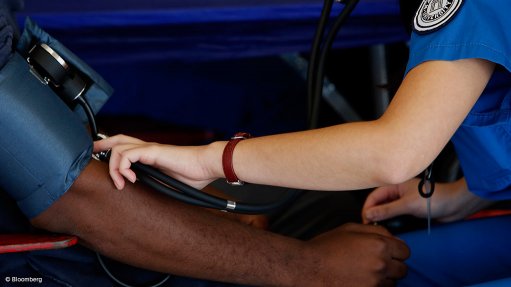
Photo by: Bloomberg
Thousands of students from the Ehlanzeni TVET College and other higher education and training institutions in Mpumalanga today underwent HIV testing and were screened for STIs and TB.
They also received information, counselling, referrals for treatment and the entire package of health and support services that are covered by the HEAIDS First Things First programme – including the distribution of condoms, screening for non-communicable diseases, and sexual reproductive health and rights advice.
This was part of today’s Mpumalanga Provincial launch of the HEAIDS 2016 First Things First (HIV,STIs, TB) programme, undertaken by the Higher Education and Training sector and led by the Deputy Minister of Higher Education and Training, Mr Mduduzi Manana.
HIV prevalence in Mpumalanga is estimated to be second only to KwaZulu-Natal which has the highest in the country. Here, long distance truck drivers, as well as migrant workers serving the mining, agriculture and forestry industries are among those blamed for a devastatingly high HIV prevalence rate.
The Maputo Corridor, linking Gauteng with Maputo harbour, traverses the district along the N4 national road, offering easy access to the area as well as providing export opportunities for companies operating in the area. This, accompanied by unemployment and alcohol abuse makes the youth in the area more susceptible to contracting the disease.
More importantly, these impact on college and university through-put rates, drop-outs and poor graduate competency levels – thereby affecting the sector and economy in general.
The Deputy Minister of Higher Education and Training was joined by a representative of the Mpumalanga Province MEC for Health Mrs Duduzile Mdluli, Nkomazi Executive Mayor Cllr Thulisile Khoza and CEO of Ehlanzeni TVET College, Dr Thabang Dhlamini at the Mlumati campus for the event at which students accessed the above-mentioned package of health and wellness interventions as coordinated through HEAIDS.
Championed by the Department of Higher Education and Training, the Higher Education and Training HIV/AIDS programme or HEAIDS – which implements the First Things First programme – is a national collaboration. It is devoted to advancing health education and awareness of HIV, STIs, TB and other related health and social conditions that set back progress by young people.
First Things First reaches across 429 campuses of the 50 public technical vocational education and training colleges (TVETs) and 26 universities to benefit about two million students.
Dr Ramneek Ahluwalia, Director of HEAIDS, said that First Things First is now in its sixth successful year. It speaks to the first priority of every young South African to look after their health and wellbeing.
“The 2015 First Things First data has shown that more than 175 000 young people were screened and tested for HIV. The programme was also a critical intervention to this population as it brought essential sexual reproductive health and rights services within students’ easy access.”
Dr Ramneek Ahluwalia alluded to the fact that since the Mpumalanga Province is a mining region and borders Swaziland and Mozambique, it was critical for the HEAIDS programme to strengthen lobbying for partners that will screen students for TB, as there is a potential for it to grow as an epidemic in such an area.
“We begin this year’s push for better health with the commitment to improve on the achievements of last year,” Dr Ahluwalia stated.
Speaking at today’s event, Deputy Minister Manana stressed that healthy and productive graduates are a cornerstone of a healthy economy. Universities and colleges provide the ideal environment within which to improve students’ knowledge about HIV, STIs, TB and other health conditions and to promote testing and services to protect and care for young people.
“We each have one responsibility above all others – to look after ourselves. The higher education and training sector is in a unique position to lead a movement that achieves this from the inside, as well as through links with all other stakeholders that provide health services in South Africa. The youth in these colleges are our future leaders and we can guide them to make the right choices. Ultimately their health is in their hands,” said Deputy Minister Manana.
Issued by Government Communications and Information System on behalf of The Ministry of Higher Education and Training